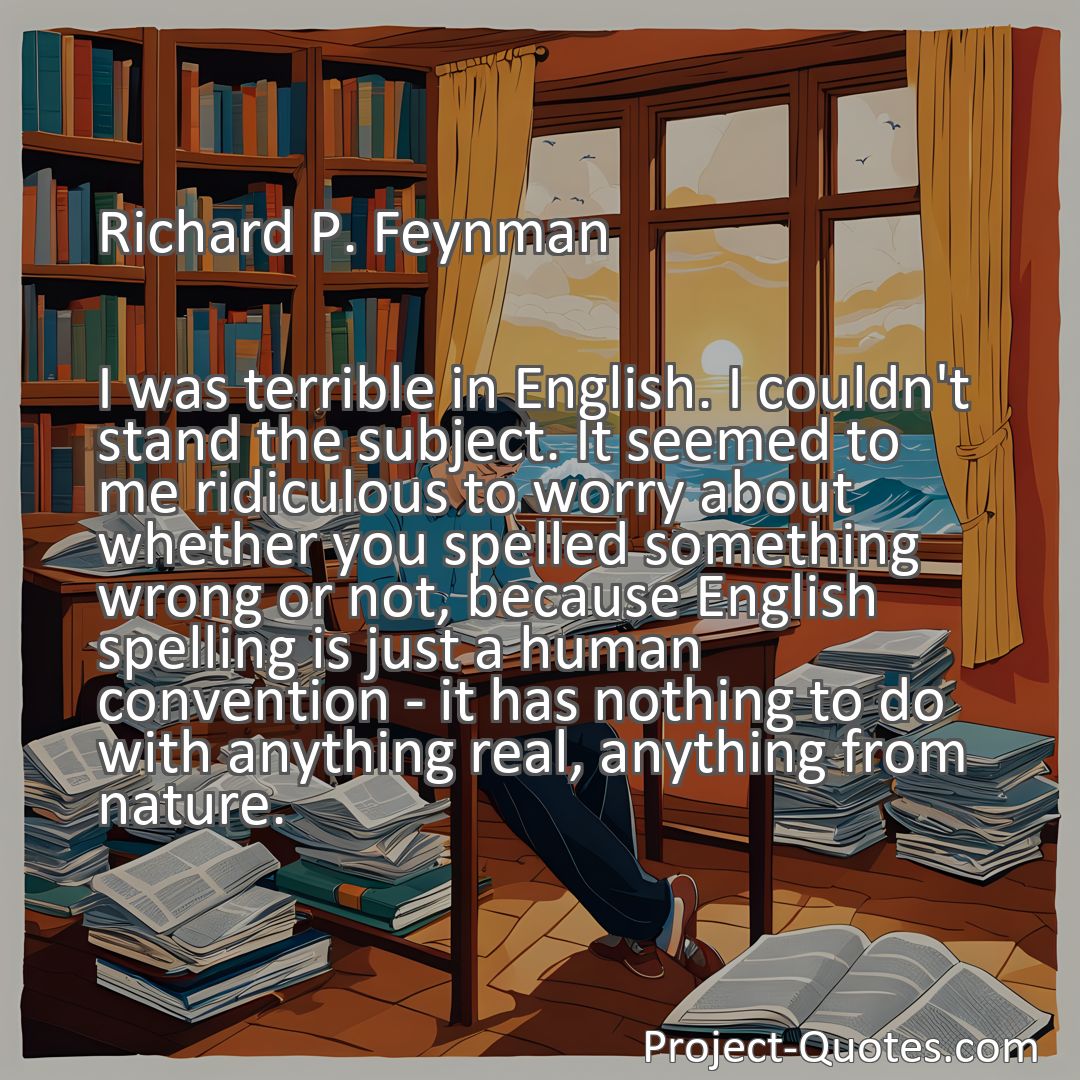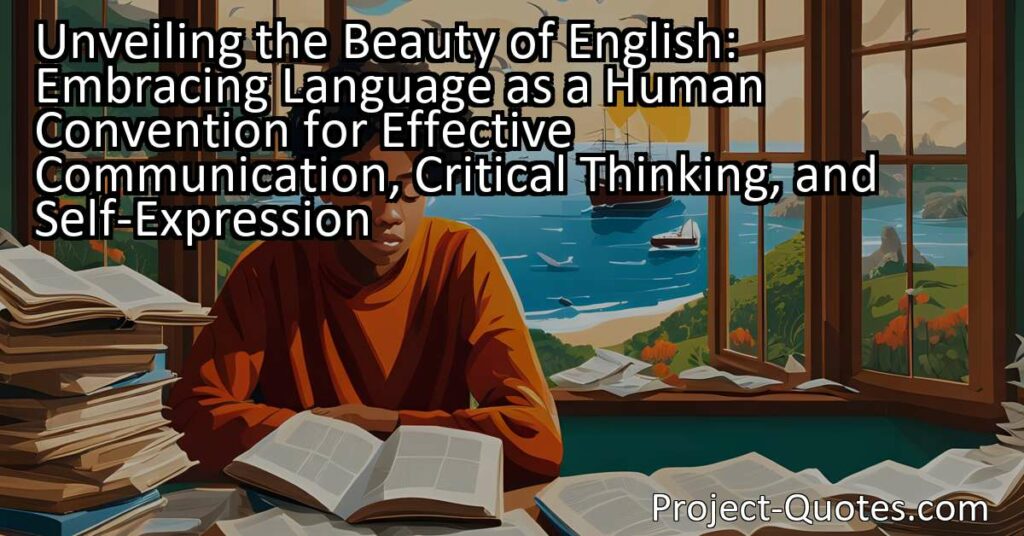I was terrible in English. I couldn’t stand the subject. It seemed to me ridiculous to worry about whether you spelled something wrong or not, because English spelling is just a human convention – it has nothing to do with anything real, anything from nature.
Richard P. Feynman
Discover the true beauty of the English language as a vital tool for effective communication, critical thinking, and self-expression. While English may seem complex and daunting, it is a reflection of our culture and history, serving as a bridge to connect with others. Dive into the world of language and unlock endless opportunities for personal growth and exploration. Embrace the malleability of language and unleash your creativity and love for literature.
Table of Contents
- 1 I was terrible in English. I couldn’t stand the subject. It seemed to me ridiculous to worry about whether you spelled something wrong or not, because English spelling is just a human convention – it has nothing to do with anything real, anything from nature.
- 2 Richard P. Feynman
- 3 Meaning of Quote – I was terrible in English. I couldn’t stand the subject. It seemed to me ridiculous to worry about whether you spelled something wrong or not, because English spelling is just a human convention – it has nothing to do with anything real, anything from nature.
- 4 Freely Shareable Quote Image
- 5 Related
Meaning of Quote – I was terrible in English. I couldn’t stand the subject. It seemed to me ridiculous to worry about whether you spelled something wrong or not, because English spelling is just a human convention – it has nothing to do with anything real, anything from nature.
Unveiling the Beauty of English: Embracing Language as a Human Convention
Introduction :
English is undoubtedly a complex language, and for some, it can be an arduous subject to tackle. In Richard P. Feynman’s quote, he candidly expresses his disdain for English, particularly in regard to spelling. While his sentiment may resonate with many, it is essential to recognize that language is not solely about strict rules and conventions. By gaining a fresh perspective on the significance of language and its inherent value, we can come to appreciate the beauty that lies within it.
Language as a Reflection of Human Culture :
Language is an intricate tapestry woven by human beings throughout time. It serves as a mirror reflecting the cultural, historical, and social aspects of a society. English, like any language, encompasses more than just vocabulary and grammar rules; it carries the weight of our collective experiences. Spelling, though seemingly arbitrary at times, provides a structure that preserves the evolution of language as it changes over time.
The Role of Communication :
At its core, language serves as a medium for effective communication between individuals. Whether written or spoken, English allows us to express our thoughts, emotions, and experiences. Through rich and accurate communication, we form connections with others, fostering understanding and empathy. While spelling may seem trivial, it ensures that our message is conveyed precisely, leaving little room for misinterpretation.
Enhancing Critical Thinking and Analytical Skills :
English, beyond its surface-level concerns such as spelling and grammar, enables us to sharpen our critical thinking and analytical abilities. Reading and understanding complex texts, analyzing arguments, and synthesizing information are all crucial skills nurtured through the study of English. Moreover, the subject empowers us to express our thoughts effectively, both orally and in written form. These skills are invaluable, not just within the realms of academia but throughout various aspects of our lives.
Language’s Connection with Nature :
While it may be tempting to perceive language as detached from the natural world, it is important to acknowledge its relationship with nature. Language distinguishes humans from other species, allowing us to reflect on and interpret the world around us. Through language, we can describe the beauty of nature, appreciate its wonders, and articulate our understanding of the natural phenomena that shape our existence. English, much like any language, carries the ability to capture and transmit our connection with nature.
Cultivating Creativity and Empowering Expression :
English offers an expansive canvas for creativity and self-expression. It grants us the opportunity to experiment with language, employing vivid imagery, metaphors, and similes to evoke emotions and paint pictures with words. Through creative writing, poetry, and storytelling, English enables us to share our unique perspectives and narratives. By embracing the malleability of language, the boundaries of self-expression become limitless.
English as a Gateway to Diverse Literature :
The realm of English literature encompasses a vast array of genres, styles, and authors from various cultures and time periods. Engaging with literature exposes us to new ideas, different perspectives, and diverse human experiences. It enables us to cultivate empathy and broaden our understanding of the world. Exploring the works of renowned authors, such as William Shakespeare, Jane Austen, or Maya Angelou, can expand our literary horizons and spark a lifelong love for reading.
Conclusion :
Richard P. Feynman’s sentiment toward English spelling is understandable, as language can indeed seem daunting at times. However, by delving deeper into the world of language, we unravel its intricate beauty and the integral role it plays in our lives. English, as a human convention, is a powerful tool for communication, critical thinking, self-expression, and cultural preservation. Ultimately, embracing the complexities of language allows us to appreciate the richness of its tapestry and unlock countless opportunities for growth and self-discovery.
I hope this quote inspired image brings you hope and peace. Share it with someone who needs it today!


